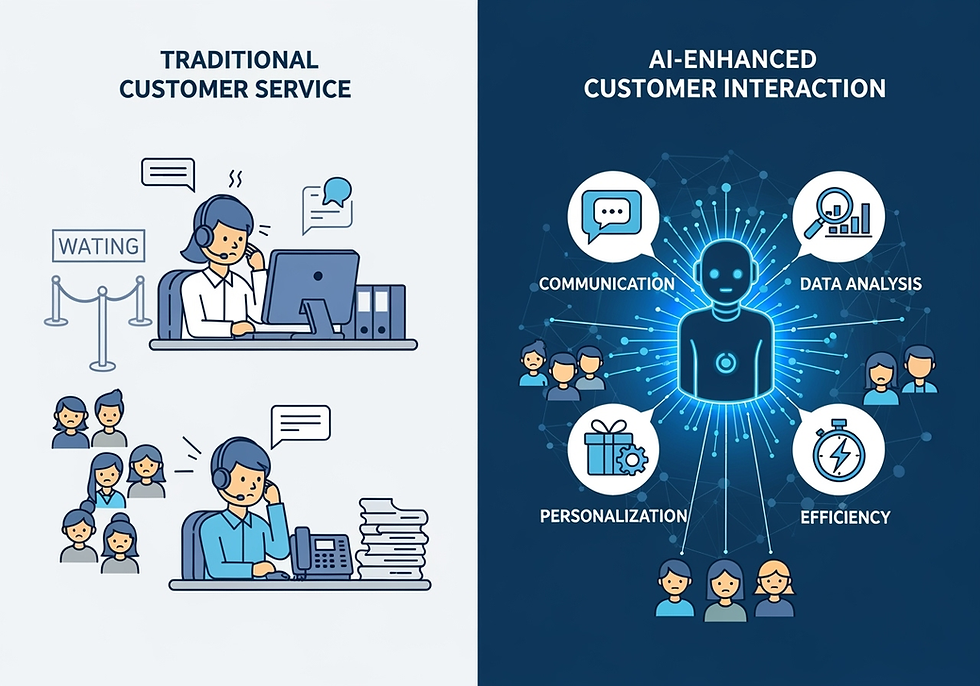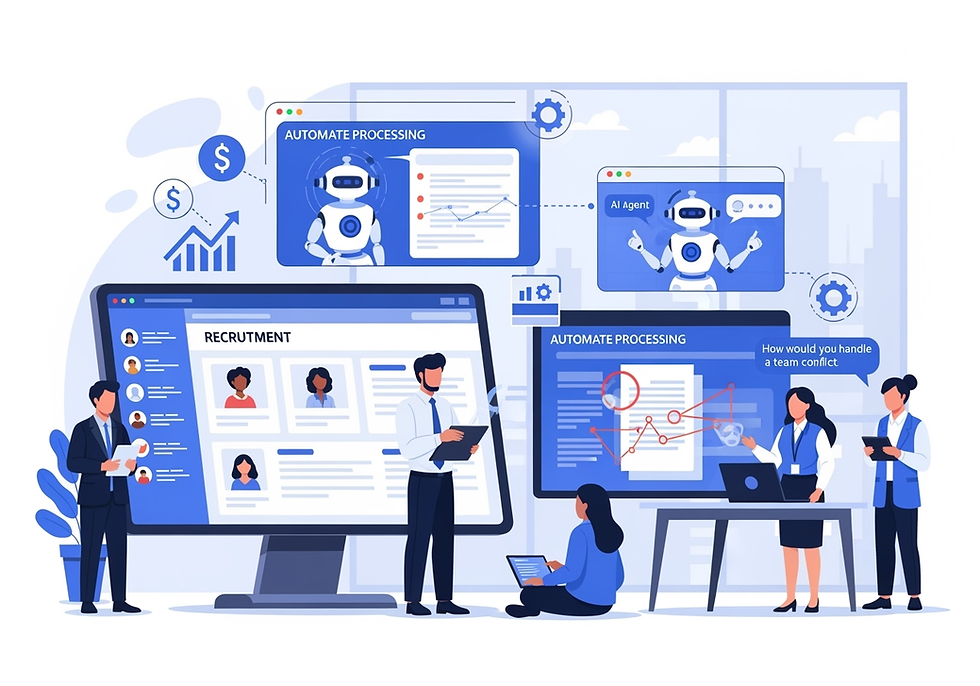How AI Agent Integration Transforms Customer Engagement for SMEs
- Shreya
- Sep 9, 2025
- 5 min read
In today’s digital-first economy, customer expectations are evolving at lightning speed. No longer satisfied with slow responses or generic interactions, consumers now demand personalised, instant, and seamless experiences across every channel they use. For small and medium-sized enterprises (SMEs) in the UK, this shift creates both challenges and opportunities. Unlike large corporations, SMEs often lack the manpower to provide round-the-clock customer support and multi-channel communication.
This is where AI agent integration steps in. By combining artificial intelligence with business systems, SMEs can scale their customer engagement, build stronger relationships, and deliver experiences that rival those of much larger competitors—all without inflating operational costs.

What Is AI Agent Integration? A Simple Breakdown for SMEs
AI agent integration refers to embedding intelligent software agents into your existing customer touchpoints—be it websites, e-commerce stores, social media channels, or CRM systems. Unlike basic chatbots, AI agents use natural language processing (NLP), machine learning, and predictive analytics to understand customer intent, adapt responses, and learn from interactions over time.
For SMEs, this integration means that your customer support, sales enquiries, marketing interactions, and even recruitment processes can be enhanced by AI-powered systems. In practice, AI agents can answer FAQs, recommend products, qualify leads, provide after-sales support, or guide candidates through recruitment pipelines—all with a human-like touch.
From Chatbots to AI Agents: The Evolution of Customer Interaction
Traditional chatbots, often rule-based, were designed to deliver scripted answers to simple questions. While they helped businesses automate basic tasks, they lacked the intelligence to handle nuanced conversations. Customers quickly grew frustrated when chatbots failed to understand context or provide real solutions.
AI agents represent the next stage of evolution. Powered by advanced AI, these agents can interpret customer intent, maintain context across conversations, and even escalate complex issues to human agents when needed. For SMEs, this means delivering a professional and polished customer experience that builds trust rather than eroding it.
24/7 Availability: Meeting Customer Needs Beyond Business Hours
One of the most immediate advantages of AI agent integration is round-the-clock availability. SMEs often operate with lean teams and limited resources, making it impossible to provide 24/7 live support. Yet customers today expect answers in real time, regardless of the hour.
AI agents bridge this gap effortlessly. They can handle enquiries, provide support, and even close sales at any time of day. Whether a customer browses your website at midnight or sends a query on social media during a holiday, your AI agent ensures no opportunity is missed. This constant presence enhances customer satisfaction and maximises business opportunities.
Personalised Experiences: How AI Agents Tailor Conversations
Modern consumers value personalisation. They don’t want to be treated as just another number—they expect businesses to recognise their preferences, purchase history, and unique needs. AI agents are designed to deliver exactly that.
By integrating with your CRM and customer data platforms, AI agents can personalise conversations in real time. For instance, an e-commerce AI agent might recommend products based on browsing history, while a recruitment AI agent could provide job-seekers with relevant opportunities. This level of personalisation not only improves engagement but also strengthens customer loyalty.
Omnichannel Consistency: Creating Seamless Journeys Across Platforms
SMEs often juggle multiple platforms—websites, emails, social media, WhatsApp, and more. Customers might begin their journey on one channel and continue it on another, expecting the same level of service and consistency throughout.
AI agent integration ensures that conversations remain unified across all channels. A customer who asks a product question on Facebook Messenger can later receive follow-up support via email or website live chat—without having to repeat themselves. This seamless omnichannel experience builds trust and portrays SMEs as professional and reliable, putting them on par with enterprise-level competitors.
Boosting Sales and Conversions Through Intelligent Customer Support
AI agents do more than answer questions—they actively drive revenue. By engaging with customers in real time, AI agents can recommend products, upsell complementary items, or remind shoppers about abandoned carts. In service industries, they can qualify leads, book appointments, or guide potential clients to the right services.
For SMEs, this proactive engagement can translate into a significant boost in sales. Unlike traditional sales teams that are limited by working hours, AI agents are constantly on hand to nurture prospects, increase conversions, and create more predictable revenue streams.
Reducing Operational Costs Without Compromising Service Quality
Hiring, training, and retaining full-time staff for customer support is expensive—especially for SMEs. Yet cutting corners on customer service can damage a brand’s reputation. AI agent integration offers a practical solution: reducing operational costs while maintaining, or even improving, service quality.
By automating repetitive tasks, AI agents free up human employees to focus on more complex, high-value interactions. This balance ensures that SMEs can offer top-tier customer engagement without overstretching their budgets. The result is a leaner, more efficient operation with better ROI on customer experience investments.
Practical Use Cases of AI Agents for SMEs (Marketing, HR, E-Commerce)
AI agents aren’t confined to one department—they can be integrated across business functions:
Marketing: Nurturing leads, segmenting audiences, sending personalised campaigns, and analysing engagement metrics.
HR & Recruitment: Screening CVs, scheduling interviews, answering candidate queries, and guiding new employees through onboarding.
E-Commerce: Handling FAQs about shipping, recommending products, managing returns, and providing post-purchase support.
Customer Support: Delivering instant responses, escalating complex issues, and collecting customer feedback.
By adopting AI agents across these functions, SMEs can build a fully integrated, technology-driven ecosystem that supports both growth and customer satisfaction.
Why AI Agent Integration Is No Longer Optional for Growing Businesses
For SMEs in the UK, customer engagement is no longer just about answering queries—it’s about building meaningful, personalised relationships at scale. AI agent integration enables businesses to achieve this without adding costly overheads. By providing 24/7 support, omnichannel consistency, personalised experiences, and intelligent sales assistance, AI agents are transforming how SMEs compete in today’s digital economy.
Those who adopt early will not only meet customer expectations but exceed them, positioning themselves as forward-thinking, customer-first businesses. Those who delay risk falling behind competitors who are already leveraging AI-driven engagement.
Transform Your Customer Engagement with Omnitech
At Omnitech Business Ltd, we specialise in helping SMEs harness the power of AI agent integration. From embedding AI agents into your customer touchpoints to ensuring seamless omnichannel experiences, we provide the tools and expertise to elevate your business engagement strategy.
Whether you’re looking to boost sales, streamline HR processes, or deliver world-class customer support, our team is here to help you make AI work for your business.
👉 Ready to transform your SME with AI agent integration? Contact Omnitech Business today and take the first step towards smarter, more impactful customer engagement.




Comments